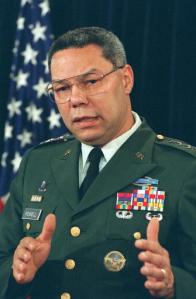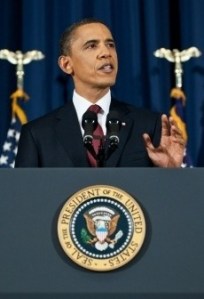Did you realize what just happened? President Barack Obama sketched out his own doctrine on the use of U.S. military force, eclipsing the one crafted by Army Gen. Colin Powell nearly a generation ago. Obama spoke Monday night at the National Defense University and detailed, in a fairly nuanced way, how and why the U.S. is wielding its military might in Libya. Powell was chairman of the Joint Chiefs of Staff when spelled out what came to be known as the “Powell doctrine.” He referred in his article to the then-ongoing U.S. operation in Somalia.
Two powerful African-Americans — one elected, one appointed — referring to U.S. military operations in Africa nearly 20 years apart, justifying their views on brandishing U.S. military power. Unlike us Swamplanders, their views count. If you need any measure how far we have come as a nation, there are few examples as profound as that.
Powell, a lifelong military man who would go on to serve as secretary of state, argued in the 1992-93 winter issue of Foreign Affairs that ordering the U.S. military into combat required a clear objective, the dedication of overwhelming force to achieve it, and the support of the U.S. public.
Obama explained Monday night why he has a more flexible view — and why he feels Libya is worth U.S. military intervention (to halt a potential slaughter), but not making the toppling Libyan leader Muammar Gaddafi an American military goal (he said that would splinter the coalition now arrayed against Gaddafi, and said the U.S. and some of its allies will try to oust the Libyan leader through economic and other non-military means).
“To be blunt, we went down that road in Iraq,” Obama said. “But regime change there took eight years, thousands of American and Iraqi lives, and nearly a trillion dollars. That is not something we can afford to repeat in Libya.” (Interestingly, Powell was the top officer in the U.S. military the first time the U.S. attacked Iraq in 1991; he championed the second war with Baghdad in 2003 as the nation’s top diplomat.)
In his 30-minute address, Obama called what the U.S. military launched in Libya two Saturdays ago an “international effort,” a “military action” that “struck regime forces” and “hit Gaddafi’s troops” and “hit Gaddafi’s air defenses” and “targeted tanks and military assets.” But he didn’t call it “war.”
Obama pledged to order the U.S. military into combat “swiftly, decisively, and unilaterally” when key U.S. interests are at stake. But for every campaign that falls into that grave category, there are dozens that don’t, ranging from peacekeeping, to genocide prevention, to humanitarian disasters. “In such cases, we should not be afraid to act, but the burden of action should not be America’s alone,” Obama said. “As we have in Libya, our task is instead to mobilize the international community for collective action, because, contrary to the claims of some, American leadership is not simply a matter of going it alone and bearing all of the burden ourselves.”
This is less a repudiation of Powell than a shift in emphasis, a push toward multilateralism and a willingness to hand off command (and responsibility) to others. Obama, he made clear Monday night, is willing to invest less in world hot spots in exchange for assuming a lesser risk.
Is this an abdication of America’s proper place in the world? Or a recognition that national will is sometimes best served by not doing it all? After nearly a decade of nonstop war, it’s a smart place for Obama to be, politically. Whether it will last as long as Powell’s doctrine will, in large part, depend on how well, or poorly, things unfold in Libya in the coming months.




